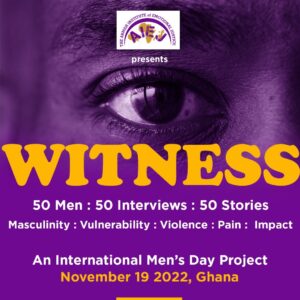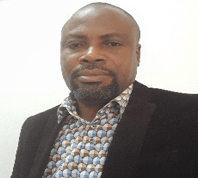How are you shaped as a man if you witness violence towards women as a teen, as a boy, as a man? How does what you witnessed impact how you think about men and masculinity? How does it shape how you see yourself as a man, and how you see women?
Questions. These questions are crucial to our work of Emotional Justice on the Continent and throughout the diaspora. It’s part of our focus on how we transform a masculinity narrative in Ghana that normalizes violence, diminishes its impact on women, shapes men, and treats silence among men who are violent as a troubling cultural solidarity. Further, it treats those who witness that violence – and stay silent – as part of a brotherhood of bystanders whose suppressed voices become part of a masculinity narrative.
To witness violence that goes unpunished, that is normalized is to be shaped by violence. We are not all shaped in the same way of course, but we make a mistake if we think it does not shape our humanity, that it does not transform our relationship to power, to progress, to people. We live in a world, in a Ghana, where violence by men towards women is normalized in our public discourse, in our communities – we call it culture, or we say it is cultural. While we may culturally normalize it, within Emotional Justice we confront an unnamed impact – there are emotional consequences for men, for who they are, for who they are not, for who they become, and for how they then move through the world, and how they shape the worlds in which they move.
Fifty men, fifty interviews, fifty stories. Talk. Share. Reveal. Explore. Engage. Transform. That’s what happened with an Emotional Justice project called WITNESS. These men were from across Greater Accra and Takoradi in the Western Region. Each of them was asked a series of questions about what violence they witnessed, who intervened to stop the violence, why they themselves did not intervene, how what they saw shaped them as men, how being witness shaped what they thought of women, and how it built an emotional connection between masculinity, power, silence and violence.
“I remember in my junior high school days I used to bully and beat my female classmates because I thought that beating them would make them respect me,” said Witness 1. He is 1 of the 50 men. Each man is unnamed. This anonymity allows them to open up, and enabled the project creators, The Armah Institute of Emotional Justice, to create sacred space to share how history and lived experience shapes their masculinity. This connection between power, abuse and respect shows up and reveals how lessons about power are shared with men, modelled in behavior that has long-lasting, but often unrevealed, and unnamed impact.
WITNESS is part of our annual Emotional Justice focus with men in Ghana and Black men across the Diaspora to explore, access, identify and articulate the breadth and depth of Black men’s emotional worlds as part of a practice of healing. These worlds, these emotions need voice, breath, sound and light in order to reckon with what hurts, how hurt becomes harm, how harm is treated as manly and masculine. This work aims to explore what leads them to hurt others who look like them, who love them and who they say they love. It is also about how a violation, and violence shapes how they see themselves, who they see when they look in the mirror.
Emotional Justice is a framework to build a humanity centered healing. We treat the emotional as structural, as part of an emotional ecosystem that shapes what we then call ‘culture’. Our Emotional Justice work is to affirm and shape a masculinity of empathy and accountability, one where men hold each other accountable for the violence that they perpetuate, and end the silence of solidarity as part of what sustains a troubled, and traumatized masculinity. Each year, for International Men’s Day on November 19th, we create and execute a masculinity project. This day is honored in about 70 countries globally, and is often mocked due to global patriarchy – for us we engage the day to create a changed focus on masculinity, one that is about healing, transformation, vulnerability and emotional justice for Black men.
WITNESS is a project that reveals how witnessing violence has a toll, and the silence of being witness also has a toll. There can be no change without wrestling with and reckoning through this toll. There is too little exploration of the toll on young men, on boys, on men of what it is to witness violence, and to learn this code of silence towards other men’s violence. Of course, that does not mean there are not thousands and thousands of men who are silence breakers, who do intervene, and who do challenge other men. This project is not about those men. What this project revealed is how often silence is the response to being witness, that it is taught – not necessarily with words, but with action, and through modelled behavior.
That means becoming silence breakers when it comes to the violence perpetrated by men, and witnessed by other men is part of a journey towards a healthy masculinity whose relationship to power is not about dominion or subjugation of women, but about community. That does not mean power doesn’t matter. It absolutely does. Who aspires to feel powerless? It means our connection between masculinity and power can no longer center dominion over women, their bodies, behaviour, and future.
Numbers tell stories, they provide information. COVID has seen a global spike in gender-based violence. A 2021 Oxfam report noted gender-based violence was being pushed to the margins under the overwhelming global health focus and crisis. That is now being followed by a deep economic crisis with prices spiraling up and opportunities plummeting. Because our society marginalizes violence towards women, there is always the danger that somehow this is unconnected to the economy, and is a ‘woman thing’ to be dismissed, or worse to be treated as ‘some Western nonsense.’ We are wrong when we do this. Masculinity is also an emotional economy, it creates ideas and narratives about who you are as a man, and who we are as a community, a society, a nation and a people.
Narratives tell stories too, they provide connection. Our current government popularized the phrase ‘be engaged citizens not spectators.’ This must apply to masculinity too. To be witness is to be a spectator, to be part of an economy of silence whose toll shapes community, society and nation. This phrase of ‘engaged citizen’ must also apply so it becomes an ‘engaged masculinity’, connected to humanity and an idea of power that affirms empathy and accountability, and no longer supports silence, and violation as a rites passage of accessing your power.
What kind of man are you? What did you witness that shaped you as a man? How did being witness, harm you? What toll did it take? How did it shape a relationship to power, a connection to women, your understanding of yourself as human? Men need healing too from being witness to violence that has long-lasting impact, that haunts, that shapes who they become.
Emotional Justice is for you, for the men in Ghana.











